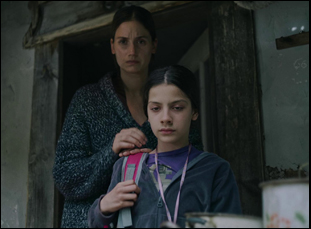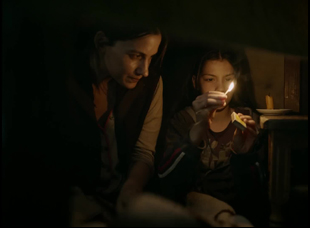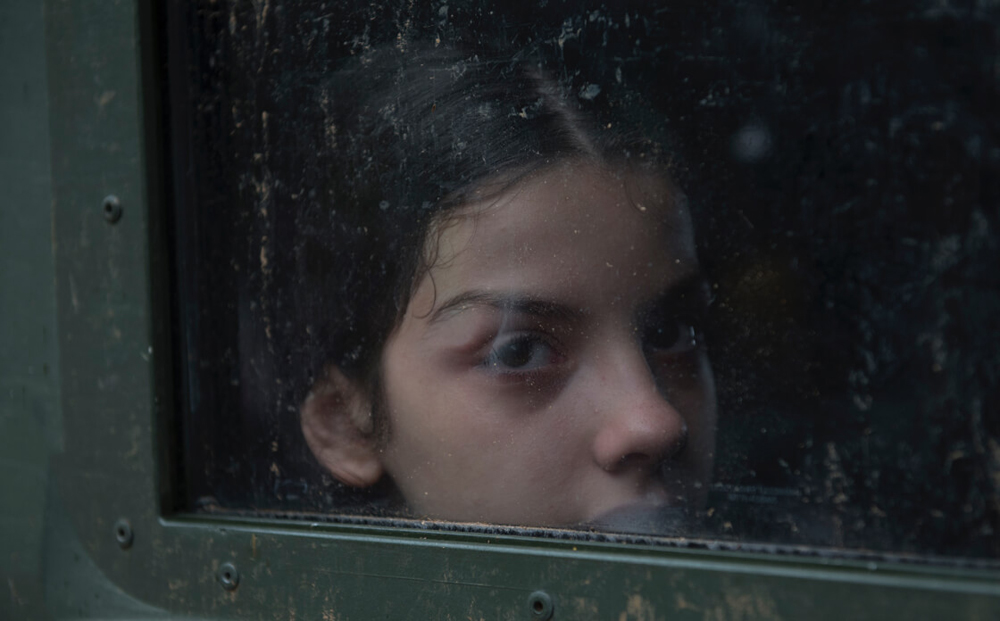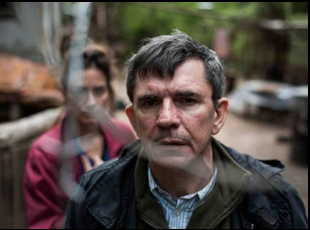Every day Milica (Miona Ilov) arrives back in her classroom in “Darkling,” a rare occasion when the ongoing war in Kosovo has prevented her family including her mother Vukica (Danica Curcic) and her grandfather Milutin (Slavko Stimac) from even stepping outside their house most days), there’s a few less classmates there. Some are feared to have been caught in the crossfire, but more likely they have moved out as the area is evacuated for safety, leaving the 11-year-old to wonder why her family hasn’t done the same. There are reasons to stay put, as Milutin clings to hope that his son, Milica’s father, might return home after being missing for a year, and the farm he’s tended to for decades can continue to provide some sustenance that can’t be counted on outside the gates, but even the adults in the room start to question what they’re doing as the howls of wolves and squawking birds conspire with the sound of gunfire make their way into the house, penetrating any feeling of safety that the walls could afford.
It’s a unique setting for what becomes a muscular and tense siege thriller in Dusan Milic’s fourth feature, with the director envisioning the instability that Serbians living in the north of Kosovo experienced after Yugoslavian-Serbian forces attempted to drive out Albanians in the region at the turn of the 21st century, making them feel as if they were citizens without a country. While international peacekeepers patrol the area, none have the authority to help the family in “Darkling” in a significant way and basic services such as electricity and phone lines are no longer maintained, leaving Milica, Milutin and Vukica on their own to fend off any intruders, though they seem most at risk of giving into their darkest thoughts. Through shrewd compositions and immersive sound design, Milic takes audiences into a single location for much of the film that reflects the fear that permeated the entire country outside of it.
For that reason among others, it was only natural that Serbia selected “Darkling” as its official entry to the Oscar for Best International Feature and recently, Milic graciously spoke about embracing genre conventions to recount this history in such a gripping way, the inspiration of a real-life letter written by a young girl to the president of Serbia and how the film’s cast came together.
I started to write a script in 2015 because I found an article in the newspaper that was really, really touching about that girl who wrote the letter to the president of Serbia to read in front of United Nations General Assembly. It was very emotional letter, and I just tried to figure out a way to present the story about this event that happened in 2004. I went down to the southern province of Serbia in Kosovo to see how those people are living and to see for myself what is happening down there. It was really a difficult situation, but I [worked on] that story for a couple of years and it started as a normal psychological drama, but later on I moved into a little bit more in the genre kind of filmmaking. I’m a big fan of films of Alfred Hitchcock, so I started from there when I wanted just to make something that is that is disturbing and very potent.
Was the prospect of doing something largely confined to a single setting daunting or exciting? You really find a way to make it dynamic.
I do photography for myself for a long time, so I know a lot about lenses and I never use 10 or 15 lenses for the filmmaking. I’m using just two or three, and I know how to place the camera for that specific lens in front of the actor, from which position — low angle, normal angle or high angle. I’m writing my scripts with [with this in mind], and I was doing this blocking with my director of photography Kiril [Prodanov], so he helped me a lot with changing positions, not to be repetitive and to find new angles all the time for the film because it’s a very [contained] film. You have just three actors and one house, and that’s almost it. I learned a lot from Oliver Stone’s “Talk Radio,” and it was a complete set. We just needed that specific place to build a house and we found the location in the south of Serbia, it was just a piece of land with a very dense forest in it, and I had a very good production designer who did more than 200 feature films in his career. [The set is] completely made from the scratch.

Miona is a very interesting girl. We were looking for the main role for that girl, and [saw] more than 120 little girls from all around Serbia. I had a really good casting director as well who lives in Prague, in Czech Republic, and he did a lot of great films in his career. For three weeks, we were looking in a specific part of Serbia because of the dialect, and [Miona] was on this short list and at the end, I picked her because I found something remarkable and very deep in her eyes. I knew that I would have Slavko [Stimac] from the very beginning because we’ve been friends for a long time, and I needed somebody like him to play the grandfather. But for Danica, the mother, she’s based in Denmark, not Serbia, and she works all around the world and I met her a long time ago in Berlinale because she was one of the Shooting Stars in 2014. We met there by accident, and after many years, my producers told me, “Why don’t we try Danica Curcic, the Danish actress for this role of mother?” And when we did the audition, she was great and because she’s not based in Serbian cinema, she had a [fresh] face, which is what I wanted.
From the very beginning, I needed to know what actors I wanted for this film and after we did all the agreements, we were working on the set, at that same house for two weeks, just rehearsing and blocking the scenes. I’m talking just about [Danica and Slavko] because I worked with the two of them. I didn’t want to interfere with [Miona] in this rehearsal because I was really afraid what might happen with her, because she was 11 years old at the time. We were all together afraid of what would happen in the first shooting day, but as you see it, [Miona] did a really, really remarkable job.

It’s always challenging. Every single day of film shooting is always challenging. I never consider shooting days the pleasure of being filmmaker. I always consider the toughest job is what I have to do in front of me for that day, so it was really stressful for me, but in a moment when you see that things are developing in a right direction, you can calm down a bit and can focus on different sides of filmmaking and for this film, I had luck with actors.
I’ve heard you talk in relation to this film about the situation in the Ukraine, and unfortunately there’s so many echoes around the world beyond Kosovo involving this type of situation. Were you conscious of this as a contemporary story as much as a story that’s set in the past?
Yes, I think so. When I started to prepare [for filming], it was [during] COVID, so I just [began thinking to] myself that we are all together hiding from something outside that is coming to us, but [once we] finished the film then this war in Ukraine started, and I can say, this is [the most] anti-war film that I’ve done. [For] any 11-year-old, being in that situation, wherever it might happen, it’s a hell, and this is the story about the fear that is inside of this little girl that just started her life recently. What if this girl is some new Mariah Carey or Albert Einstein or Nicola Tesla, but she never had a chance to develop because she was living in fear in some kind of dark cellar? That was the story I wanted to tell. It was a personal story that I carried in myself for a long time, so it was very important for me to make this film and I feel fulfilled I did this picture.
“Darkling” does not yet have U.S. distribution.





